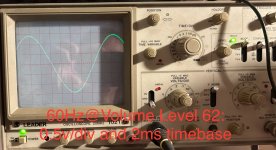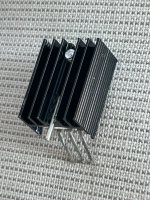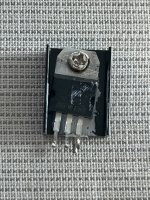I was very certain and I touched them all after the failure and none felt hot. I can run the test again and replace the blown one with another one. Also what do you make of the strange noise coming from the transformers/inductors?
When the transistor shorted, it increased the load on the amp's supply and the 12v supply. I wouldn't be overly concerned about it at this point.
If the output was not hot when it failed, they may not be reliable. Again, I think you need to pop one open.
Did any of the originals fail or did one simply have broken legs?
If the output was not hot when it failed, they may not be reliable. Again, I think you need to pop one open.
Did any of the originals fail or did one simply have broken legs?
Would sound still work if the transistor had already shorted? I was still getting audio out of the subwoofer and each time a hard bass note hit the transformer/inductor simultaneously made the whine/hiss. Then it began to make the sound more and more for a few seconds until the amp died.
Orignals didn't fail. Simply a broken leg on one original TIP142T. At one point, I considered putting a piece of wire to reinstall it, but instead decided to just buy a new set of transistors.
Orignals didn't fail. Simply a broken leg on one original TIP142T. At one point, I considered putting a piece of wire to reinstall it, but instead decided to just buy a new set of transistors.
If you can't find any good tip142s, you may have to do that.
You could also try the TIP102/107. They're rated a bit lower but may work well enough. I think this amp has more than enough output transistors to be reliable with TIP102/107.
Someone should comment if they know that the TIP102/107 wouldn't work as a sub.
You could also try the TIP102/107. They're rated a bit lower but may work well enough. I think this amp has more than enough output transistors to be reliable with TIP102/107.
Someone should comment if they know that the TIP102/107 wouldn't work as a sub.
Mouser is getting them in stock in March or I could buy them from Jameco electronics. Anyone have any experience with them?
Ok will do. In the meantime I ran another test I reinstalled the new transistors and slowly raised volume. With very low volume I tested the B+ voltage and it was at 11.9v. At the first moment I heard the the transformers squeaking it was low volume still. I then raised it 2 notches at which point I noticed the voltage drop and fluctuate to as low as 10.5v. This was still a couple notches below the max volume I listened earlier. Could it be that the power supply or the wire from the PS to the amp can’t handle it and that caused an output transistor to short? When would the voltage on B+ be considered too low?
Last edited:
What's the current rating of your 12v supply?
The low voltage would have no effect on the output transistors.
Too low? It will likely shut down at about 10v.
The low voltage would have no effect on the output transistors.
Too low? It will likely shut down at about 10v.
Its a PC ATX PS rated at 18A. Im using alligator clip wires to connect it to the amp. I estimate the wire is 16-18g and about 18” long. On the PS I combined all the 12v wires into one and connected the alligator clip. This wire could also be the weak link in the chain.
Using my function generator I fed a 60hz signal to the amp and found the exact volume point where the transmormer squeaks. It’s at 3Vpp. Also I let it run a few seconds and measured the temp on the output transistors and they were climbing. I turned it off at 100F. Wasn’t certain if I could let them go higher. Datasheet states storage temp max at 150C. Is that how high it can heat up? Also the voltage on B+ only dropped to 11.5v at this volume.
Attachments
Last edited:
I wouldn't get them too hot. Do you have heatsink compound on the ones mounted to the metal tool?
The temperature and current/power dissipation are significantly derated at 150°C. Look at the datasheet for the derating curve.
The temperature and current/power dissipation are significantly derated at 150°C. Look at the datasheet for the derating curve.
I decided to buy individual heatsinks for them. I tested it again and noticed that one transistor gets much hotter than the others. I let it run until it reached 150F. The others were all below 100F. I pushed the volume higher on this test than yesterday. Is this normal behavior? I may try the original transistors to compare.
Move the hot transistor to another location, including to a different heatsink (one that was cooler). Does the heat follow the transistor or does it remain with any transistor in the previously hot location?
It appears to be random but mostly one transistor heats up. One test two heated up. But it’s not tied to a location or transistor or even tied to original versus new. I swapped out the new for the originals and same random transistor heats up. At first I thought it could be bad soldering on the one heating up so I applied more solder to those but it would then continue to randomly pick one Q2-Q6 transistor. I can’t tell if any others are heating up since they are under the board on the heatsink. I stop the test when a transistor reaches 150F which takes about 2-3mins of playing a 50hz sinewave at 4Vpp and the load is 1.5ohms.
What sort of heatsink are you using now?
Are you sure that the thermal mating to the heatsink is consistent?
Are you sure that the thermal mating to the heatsink is consistent?
What I think is likely happening is that one starts to heat up and then, it's threshold decreases and it starts to pass more current. At that point, it starts to avalanche and overheats. When all are on the same heatsink, their temperatures are kept approximately the same so they tend to share current more evenly.
Maybe that’s what happened to the new transistor that shorted. I have noticed they cool down pretty quickly after the amp is shutdown. So maybe when I took the temps it was too late. Therefore, should I install the new ones on the pcb and heatsink and see how they perform? Are there any tests I can run with them hardwired to see if they are performing to spec prior to installing them?
I thought of another test. I applied a house fan onto the amp and heatsinks while playing music and the 50hz tone. It stayed cool and played for 10mins without an increase in temp. Q2-Q6 were all room temp. I then tried it with the new transistors and one got warmer than the others but not hot. It was 110F while the others were 85F. I even pushed the volume higher for one additional minute and the new transistors handled it
- Home
- General Interest
- Car Audio
- Soundstream Rubicon 502 with DC voltage in right channel


